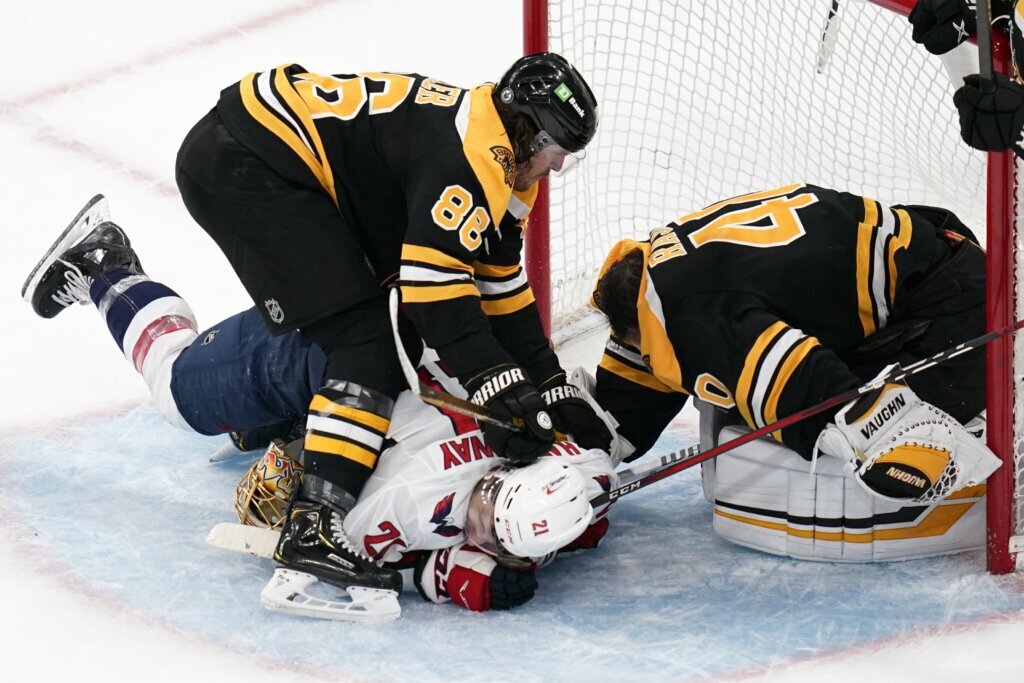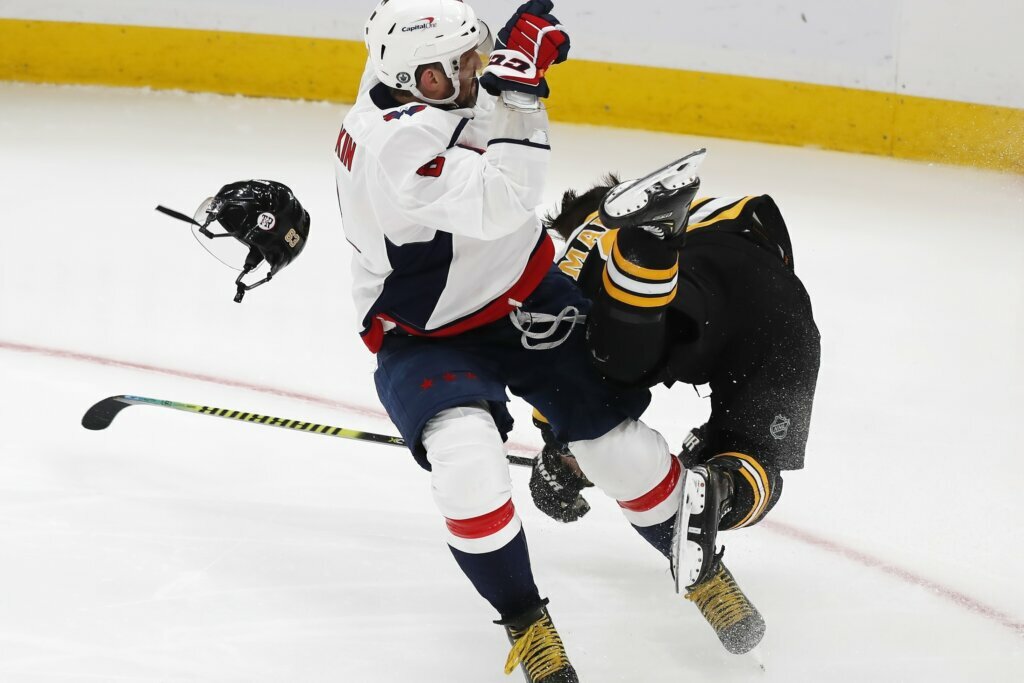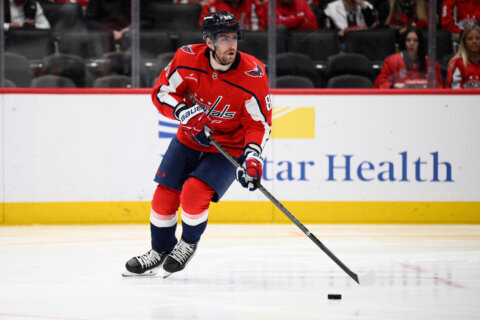
Coming off a listless showing Friday night in Boston, the Capitals season is suddenly on the brink. After three tightly-contested games to open their series (the first three games all went to overtime), the Bruins easily brushed the Capitals aside in a 4-1 Game 4 win at TD Garden.
The Bruins now lead the series 3-1, with the Capitals facing elimination and the possibility of a third consecutive first-round exit.
“The execution I think was way off last night,” said Capitals coach Peter Laviolette. “But we’ve got to move past it. There’s no room for the weak in playoffs… We’re faced with a situation where we know we’ve got to be better, and the only thing you can do is respond. Our guys are preparing for that game right now.”
Game 5 is Sunday at Capital One Arena (7 p.m., WFED 1500AM). While the Bruins will look to become the first team to advance to the second round this spring, the Capitals have a more modest goal of simply trying to force the series back to Boston for Game 6 on Tuesday. In order for that to happen, the Capitals must be better in several areas.
After ranking fourth overall during the regular season in five-on-five scoring (2.3 five-on-five goals per game), the Capitals have been held to just six even-strength goals in four games in the playoffs. Four of those goals have come from fourth-liners Garnet Hathaway and Nic Dowd.
Secondary scoring is a must for any team with aspirations of a deep postseason run, but it should be just that — a secondary or complementary piece to the scoring puzzle. For the Capitals, much more is needed from their headliners both at even strength and on the power play.
The Capitals were outshot 37-20 in Game 4 and at one point went nearly 19 minutes without a shot on net, spanning the first and second periods.
Outside of Alex Ovechkin, who had four shots on goal in Game 4, the other five forwards who made up Washington’s top-two lines finished with four shots on goal between them.
“You’ve got to get pucks to the net, you’ve got to create offense,” said Tom Wilson, Washington’s only top-six forward with an even-strength goal in the series.
“You’re not going to get enough chances if you’re not getting to the guts of the ice or to the net-front. So, we’ve got to do better and we’ve got to be ready for tomorrow.”
While the Capitals seek more from their top players, the Bruins have successfully leaned on theirs throughout the series.
Boston’s No.1 line of Brad Marchand, Patrice Bergeron and David Pastrnak has proven a handful with five goals and nine points between them. Marchand scored in three-straight games (including a pair of power-play goals), while Pastrnak had the game-winning goal and an assist in Game 4.
Throw in No.1 defenseman Charlie McAvoy, who had three assists in Game 4 and skated a game-high 26:18, and goalie Tuukka Rask, who stopped 54 of 57 shots over the past two games, and Boston’s headliners are delivering.

The Capitals, conversely, have looked tired.
“I feel like we have to want it,” said Nicklas Backstrom, the Capitals leading scorer during the regular season. He’s been held to one assist in four playoff games.
“I think it’s obviously a big game coming up and so we’ve got to be mentally ready and we’ve got to play for each other. That’s maybe something we didn’t do [in Game 4].”
The Capitals will also be looking to improve on both special teams’ units after going 1 for 7 on the power play in Game 4 and watching Boston go 3 for 5 on their man-advantage opportunities.
Washington had two power-play chances in the opening six minutes of Game 4, but couldn’t convert or create any positive momentum. The chance to set the tone early in a critical game was there, but the Capitals didn’t take advantage. Two more power-play chances late in the second period when trailing 1-0 also went for naught.
“I think we’ll probably switch some things up,” Wilson said. “It’s playoff hockey, they’re blocking shots, they’re making it tough. Power play, we’ve got to do better. Those are big moments and we’ve got to chip in and find a way to capitalize.”
In eight games against Boston during the regular season, the Capitals were 9 for 30 on their power-play opportunities. Four games into their playoff series, the Capitals are 3 for 17.
Given the sense of urgency that was expected from Washington in Game 4, it was particularly unsettling for the Capitals to struggle on the power play while managing just six shots on goal in 12:38 worth of man-advantage time.
“I feel like we have to come up with something new here,” Backstrom said. “I feel like they’re reading us pretty well.”
Now the Capitals are in the unenviable position of trying to overcome a 3-1 series deficit for just the third time in franchise history. Washington rallied from 3-1 down in a first-round series in 1988 (vs. the Philadelphia Flyers) and in 2009 (vs. the New York Rangers).
Historically in the Stanley Cup Playoffs, a team has rallied from a three-games-to-one deficit and won a best-of-seven series just 29 times out of a possible 320 (9.1%).
Laviolette’s 2010 Philadelphia Flyers were among the exceptions, coming all the way back from a 3-0 series deficit to shock the Bruins in seven that year.
The recipe for the Capitals to complete a similar comeback?
“I don’t think you can have this long-term plan,” Laviolette said. “It’s got to be a real short-term plan — shift by shift, period by period and just one game. And that’s all you really talk about, all you really think about: making sure the guys are prepared, making sure they’re ready and then you go out and fight for it one at a time.”






